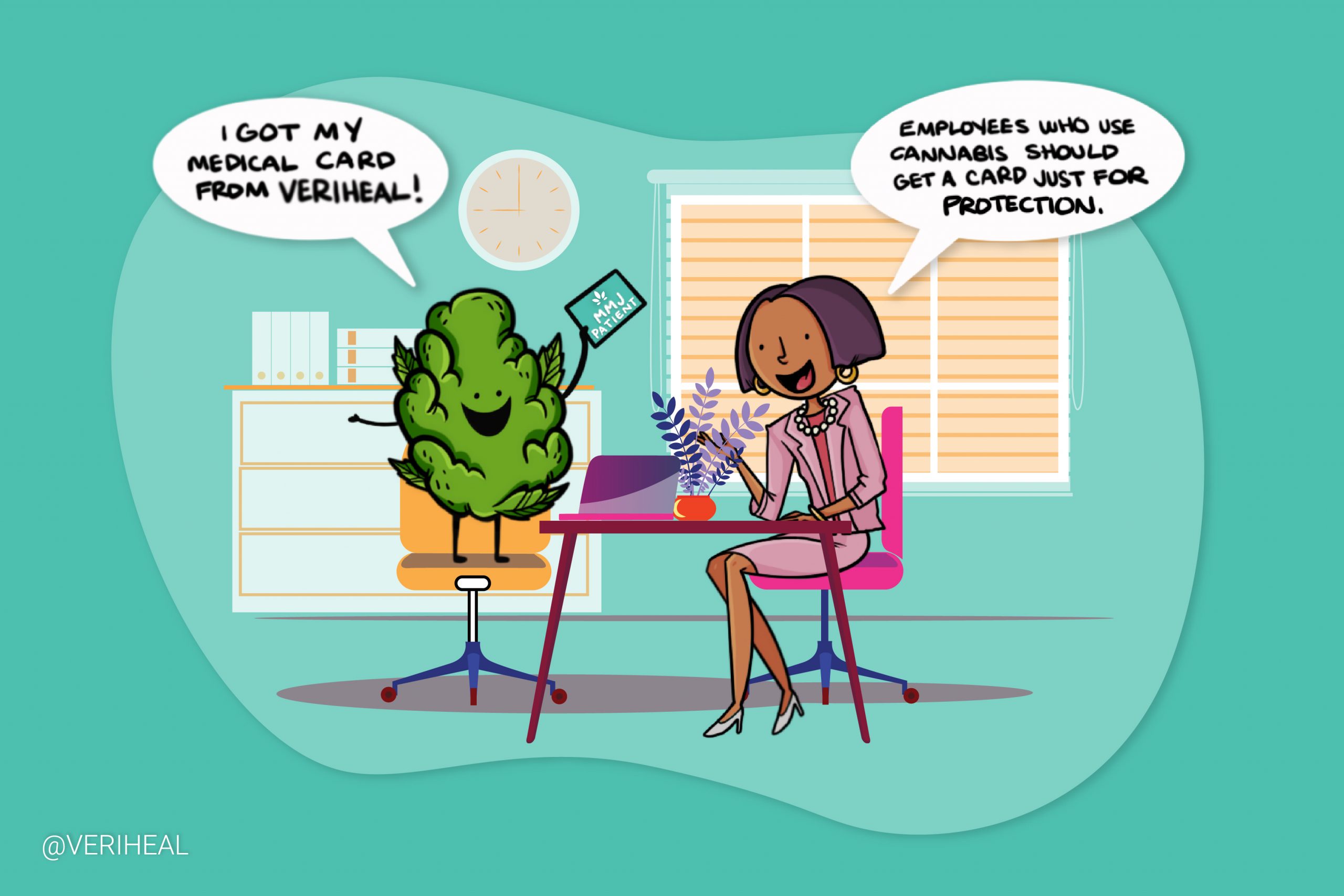The November 2020 election was a great win for advocates for cannabis legal reform, with four states voting to legalize recreational cannabis, joining the 11 other states that have decriminalized recreational cannabis use. South Dakota, in addition to legalizing recreational use, passed medical cannabis legislation—as did Mississippi—bringing the total number of states where cannabis is legal in some way to 36.
For those living in states where cannabis was legal for medicinal use and now are living in the new world of recreational use, it may be tempting to forego bureaucracy, medical tests, and licensing fees in order to access their medicine, but some lawyers have written that medical may still be the way to go to keep on the good side of employee handbooks.
Medical Cannabis and Employment
Employers and their lawyers have been grappling with the implications of medical cannabis for years, while most agree that employers are still able to enforce a drug-free workplace, regardless of an employee’s medical cannabis status, it can be more complicated.
Kami Hoskins, an associate with Phoenix labor and employment law firm Jennings, Strouss and Salmon PLC, told this writer in 2014, when medical cannabis was new in Arizona, that making sure employees aren’t impaired on the job can be an issue.
“The Arizona Medical Marijuana Act suggests that (employers) are not allowed to discriminate against cardholders for testing positive for use of marijuana, but there are other laws the employer can look at to sort of help move through the process,” she said.
More recently, and addressing more widespread issues, David Reischer, attorney and CEO of LegalAdvice.com suggested that it takes great care to walk the balancing act of keeping a workplace safe and respecting an employee’s need for medication.
“Several states have specific laws protecting medical cannabis patients from employment discrimination,” Reischer told Business News Daily in June 2020. “Typically, employers can require drug testing before employment and at random times, so long as there is no discrimination against medical marijuana users [who] are legally allowed cannabis for medicinal reasons.”
Why You Should Get Your Medical Marijuana Card
Veriheal has satisfied millions of patients nationwide by giving them access to these benefits
- Larger purchase limits
- Peace of mind
- Enhanced legal protection
- Access to higher potency strains
- Save up to 25% on cannabis purchases
- Skip the line at the dispensary
What Federal Law Says
According to legal analysis blog JD Supra in December 2020, “The federal Americans with Disabilities Act (ADA) and Rehabilitation Act expressly exclude from coverage employees or applicants “who [are] currently engaging in the illegal use of drugs.” 42 U.S.C. § 12114(a); 29 U.S.C. § 701(a); Although several jurisdictions have legalized medical or recreational marijuana use, none require employers to permit employees to use or consume marijuana in the workplace or on working time. Similarly, almost all of those jurisdictions permit employers to take disciplinary action against an employee who is under the influence of or impaired by marijuana in the workplace or on working time, even if the employee legally used or consumed marijuana while off duty. Decriminalization, in other words, bestows upon employees a defense to criminal prosecution, not an absolute, affirmative right to use medical marijuana against their employer’s policies.”
*Emphasis added by Veriheal.
JD Supra continues in their analysis to note that Pennsylvania and West Virginia permit disciplinary action against an employee who is a registered medical marijuana user and under the influence of marijuana at work only if the employee’s use results in conduct that falls below the normally accepted standard of care for that position. And “some states have enacted medical marijuana statutes that prohibit discrimination based solely on an employee’s status as a registered medical marijuana cardholder. Five of those states prohibit employers from terminating employees who are registered medical marijuana users simply because they are unable to pass a drug test.”
What Recreational Cannabis Means for Employment
As JD Supra noted above, recreational cannabis and medical cannabis are federally illegal, meaning all levels of legalization are state-specific. Using Arizona as an example, in which Hoskins previously noted an employee with a medical cannabis card can not be discriminated against for testing positive on a drug test, recreational cannabis provisions don’t seem to have as many protections.
According to Employment Law World View, a legal website, legalizing recreational cannabis in Arizona does not automatically require employers to tolerate the use of cannabis by their employees. Specifically, the Arizona legalization laws do not:
- Restrict the rights of employers to maintain a drug-and-alcohol free workplace or affect the ability of employers to have workplace policies restricting the use of marijuana by employees or prospective employees;
- Require an employer to allow or accommodate the use, consumption, possession, transfer, display, transportation, sale or cultivation of marijuana in a place of employment; or
- Restrict the rights of employers to prohibit or regulate conduct that occurs on or in their properties.
While no lawyer would go on the record for this article, based on past and recent statements in the legal communities, it appears that one would have more protections under the law with a qualifying medical cannabis card than by trusting in recreational legalization.
*This article is an analysis and is not meant to be legal advice. Please consult with an attorney in your jurisdiction if you are facing employment issues as a result of cannabis use.
Author, Share & Comments
















